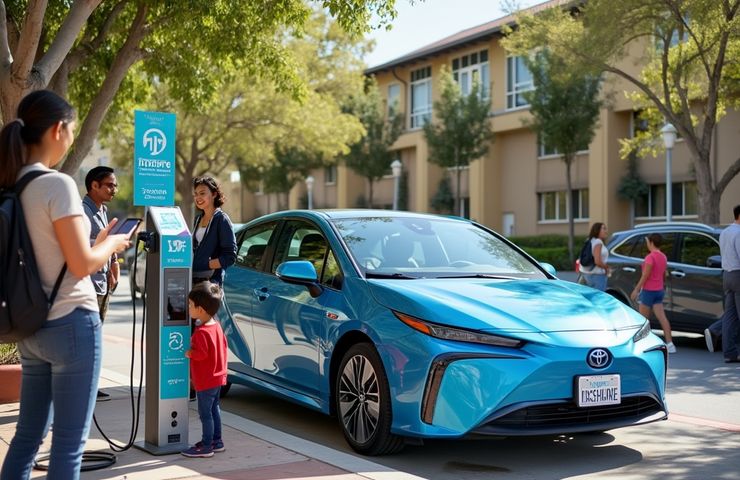Revolutionizing Transportation: Riverside's Groundbreaking Hydrogen Carshare Program
Key Ideas
- The Riverside Clean Air Carshare (RCAC) program, powered by hydrogen fuel cells, is providing affordable, zero-emission transportation options to residents of Riverside, California.
- The program features Toyota Mirai FCEVs, offering a range of 402 miles on a full tank of hydrogen and emitting only water vapor, contributing significantly to reducing CO₂ emissions in the city.
- UCR's Center for Environmental Research & Technology is collecting valuable data on sustainability metrics to inform future hydrogen mobility strategies and address transportation equity issues in communities like Riverside.
- RCAC represents a model for sustainable energy adoption and could influence the deployment of hydrogen mobility programs nationwide, shaping the future of clean transportation in the U.S.
In May 2025, the University of California, Riverside introduced the Riverside Clean Air Carshare (RCAC) program in collaboration with the California Air Resources Board and Mobility Development Operations, marking the launch of the first-ever hydrogen-powered carshare initiative in the U.S. The program aims to address transportation equity issues by providing affordable and sustainable transportation options to the residents of Riverside. With 13 Toyota Mirai FCEVs stationed across the city, the initiative offers zero-emission vehicles that can travel up to 402 miles on a full tank of hydrogen, emitting only water vapor. Priced at $6 an hour, RCAC aims to make clean transportation accessible to low-income residents, setting a precedent in the U.S. market. The program leverages centralized refueling for the fleet and is supported by UCR's Center for Environmental Research & Technology to track sustainability metrics and inform future hydrogen mobility strategies.
RCAC aligns with California's ambitious clean energy goals, showcasing the state's commitment to innovative clean transportation solutions. Backed by public grants, the program serves as a pilot for testing hydrogen-as-a-service models in communities that are often overlooked by private-sector initiatives. The initiative could play a significant role in shaping the deployment of hydrogen mobility programs across the country, influencing federal investments in sustainable transportation. By providing real-world data on hydrogen usage and environmental impact, RCAC sets a precedent for community-based sustainable energy initiatives, emphasizing the importance of local trust and tailored strategies. As California progresses towards a ban on gas-powered vehicles by 2035, initiatives like RCAC offer a practical and inclusive approach to sustainable transportation, addressing the evolving needs of car-heavy cities like Riverside. The success of RCAC could pave the way for scaling hydrogen mobility initiatives nationwide, highlighting the potential of compact fleets, shared fueling hubs, and research-backed strategies in advancing clean transportation.
Topics
Cities
Clean Transportation
Local Innovation
Community Impact
Future Of Transportation
Shared Mobility
Sustainability Metrics
California's Clean Energy Goals
Public Grants
Latest News
